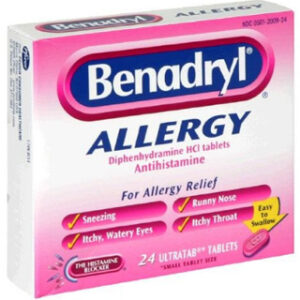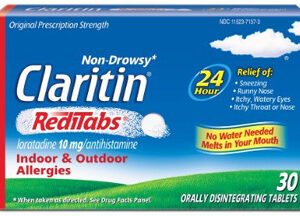Claritin Overview
Claritin, known by its generic name loratadine, is an antihistamine medication that offers symptomatic relief from allergic conditions such as hay fever, or allergic rhinitis, and is effective at alleviating symptoms like sneezing, itchy or watery eyes, and runny nose. This over-the-counter (OTC) medication is favored for its non-sedative properties, allowing patients to manage their allergies without experiencing significant drowsiness.
Usage Indications
The primary use of Claritin is for the management of symptoms associated with seasonal allergies, including the discomfort of hay fever. It is also indicated for the relief of allergic skin conditions such as chronic idiopathic urticaria, which presents as hives and itchy skin rashes. Claritin effectively blocks the action of histamine, a substance in the body that triggers allergic responses, thus providing alleviation from allergic symptoms.
Dosage Information
Claritin is dispensed in several formulations, including tablets, chewable tablets, and syrup. Adults and children over the age of 6 typically take 10 mg once daily. Children aged 2 to 6 years may consume 5 mg once daily, and the same dosage applies to individuals with severe liver conditions. The exact dosage should be determined by a healthcare provider based on the severity of the symptoms and the patient’s age and health condition.
Administration Guidelines
It is recommended to take Claritin exactly as directed on the label or prescribed by a doctor. The tablet should be swallowed whole with water, without crushing, chewing, or breaking it. Claritin can be taken with or without food, and if a dose is missed, it should be taken as soon as remembered, provided that it’s not too close to the time for the next scheduled dose. It is crucial not to double up on doses to make up for a missed one.
Contraindications and Precautions
While Claritin is widely regarded as safe for most people, certain groups should exercise caution. Individuals with a history of allergy to loratadine or desloratadine should avoid this medication. Moreover, Claritin should be used under medical supervision for patients with severe liver problems, and it may not be suitable for certain age groups unless prescribed by a healthcare professional. During pregnancy or breastfeeding, Claritin should only be used if clearly needed and directed by a healthcare provider.
Potential Side Effects
Though generally well-tolerated, Claritin can cause side effects in some individuals. The more common reactions include headaches, fatigue, and dry mouth. Children may experience nervousness or a paradoxical reaction such as hyperactivity. While severe allergic reactions are rare, any signs of an allergic response, such as rash, itching, swelling, or trouble breathing, should be immediately reported to a healthcare provider.
Interactions with Other Drugs
Claritin may interact with other medications, potentially altering their effects. For instance, certain antibiotics and antifungal drugs may increase the concentration of Claritin in the bloodstream. Additionally, interactions with other histamine blockers or antihistamines should be avoided to prevent an additive sedative effect. Patients should always inform their healthcare provider about all the medications they are currently taking to avoid unintended drug interactions.
Overdose Emergency Procedures
In the event of an overdose, immediate medical attention must be sought. Symptoms of a Claritin overdose might include drowsiness, rapid heartbeat, and headaches. If suspected, contact a Poison Control Center or emergency room immediately. Keep contact information for these services readily available to ensure quick action can be taken when necessary.
Storage and Maintenance
Claritin should be stored at room temperature away from moisture and heat. The bottle should be tightly sealed, and the medication should be kept out of reach of children and pets. It is important not to use Claritin past the expiration date or if the packaging is damaged or altered. Proper disposal of unused or expired medication is essential to ensure safety and environmental stewardship.
Claritin FAQs
Can Claritin be taken daily?
Yes, Claritin can be taken daily as recommended by a healthcare provider or the product label for ongoing allergy management.
Will Claritin cause drowsiness?
Claritin is known to be less likely to cause drowsiness in comparison to some other antihistamines. However, individual reactions can vary.
How quickly does Claritin work?
Claritin typically begins to relieve allergy symptoms within one to three hours of taking a dose.
Can children use Claritin?
Yes, children as young as two years old may use Claritin under proper dosage guidance.
Can I take Claritin with other allergy medications?
Combining Claritin with other allergy medications, especially other antihistamines, is not generally recommended without consulting a healthcare provider.
How should Claritin be taken?
The medication should be consumed with a full glass of water and can be taken with or without food.
What should I do if I miss a dose?
If a dose is missed, take it as soon as you remember, but skip the missed dose if the next one is almost due. Never double the dose to catch up.
Please note that this is a general guide and individual concerns or questions should be directed to a healthcare professional for more personalized advice.





Reviews
There are no reviews yet.